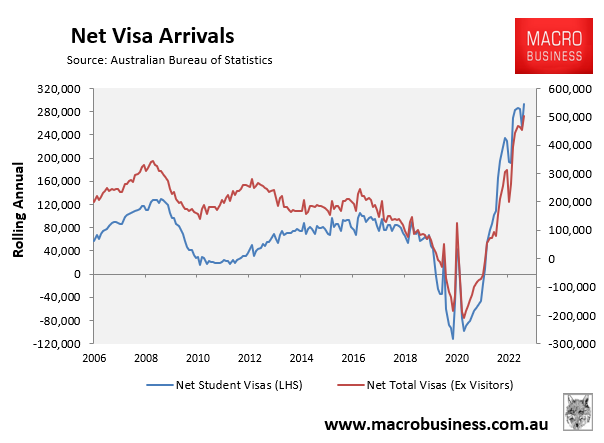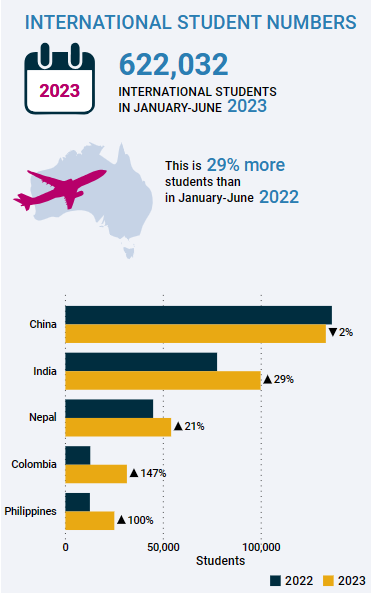Australia’s record net overseas migration (NOM) has been driven by the unprecedented rebound in international student visa arrivals.
Monthly Australian Bureau of Statistics (ABS) visa data shows that a net 294,000 international students arrived in Australia over the year to July, which drove the 503,000 increase in total net visa arrivals (excluding visitors):

Separate data from the Department of Home Affairs shows that 654,870 temporary student visas were on issue in July, which was around 100,00 more than the pre-COVID peak:

Department of Education data shows that India is among the nations driving the boom in international students:

More than a decade ago, Australia experienced a large increase in the number of Indian students enrolling in dubious VET courses like as hairdressing and cooking, many of whom went on to seek permanent residency.
Private colleges and agencies operated as ‘middlemen’ for Australia’s immigration system, earning fat commissions from fake students seeking backdoor work rights and permanent residency.
History doesn’t repeat but it sure does rhyme.
The AFR revealed earlier this year that half or more of new Indian students enrolling at several universities were either ghosting them by failing to show up for class or were being poached by rival private colleges soon after arrival, leaving these universities out of pocket and tarnishing their reputations.
A parliamentary inquiry held in May also heard evidence of private VET providers collaborating with unregulated education agents to steal students from universities for large commissions, sell work visas, and build “ghost colleges” where students do not attend classes but are awarded degrees.
Menelaos Koumides, managing director of the Australian Academy of Vocational Education and Trades, told the parliamentary inquiry that the regulatory framework was failing:
“We see institutes that we think really should not be here … they’re highly competent in licensing requirements [and they’re] gaming the system”, Koumides said.
“[There are] blow-outs in agent’s commissions … 98% of students are going through agents … these are all consequences of a regulatory system … that was never fit for purpose.”
Koumides also claimed that these “ghost colleges” were automatically passing students, and that the system is “not fit for purpose when it comes to quality, it never was”.
“It’s a rort that turns a high-quality student visa into a low-rent work visa”, said Julian Hill, a federal Labor MP who was formerly the Victorian government’s head of international education and was a member of the afore mentioned parliamentary inquiry.
International Education Association of Australia CEO Phil Honeywood likewise labelled Australia’s international education system a “Ponzi scheme” for enticing non-genuine students through migration pathways.
The “ponzi scheme” has finally come to a head with The AFR reporting that the Albanese Government will ban colleges that target international students from paying commissions to agents.
The government will also implement a series of “risk indicators” as part of a monitoring framework that will track student attendance, alongside implementing a “fit and proper person” test for college owners, and prohibiting cross-ownership between colleges and education agents.
“Thousands of newly arrived Indian students have been using loopholes in the system to abandon their courses at established universities to enrol at cheaper private colleges”, The AFR reports.
“Universities are reporting sharp increases in the number of Indian students who either arrive in Australia but never step foot in their institution or abandon their course shortly after. One university said about 500 of its expected 1200 new enrolments from India for semester two last year either did not front up or jumped ship in the first six months”.
“Use of student visas as a back door to the jobs market is also rife, with some colleges merely shopfronts with little or no teaching and administration facilities. Under the changes, student attendance will be monitored”.
“Education agents have been actively poaching students in exchange for cash, while colleges and universities offer generous discounts for students to jump ship”, The AFR reports.
Education Minister Jason Clare claims the reforms will stop “shonks and dodgy operators trying to exploit students and make money out if it”.
However, Abul Rizvi questioned the effectiveness of the changes, pointing out that some reforms had previously been implemented but had failed to identify unscrupulous operators:
“We have used risk indicators to manage the student visa system since 2001. The change here would appear to be that the government will use them more widely and in particular by the education regulators”, he said.
“My fear is that the regulators’ response will remain weak – as it almost always has been – unless the government also uses some objective pass/fail measures”.
While it is good to see the Albanese government take belated action against the blatant rorting of the student visa system, we should remember that it signed the Australia-India Migration and Mobility Partnership Agreement in May, which includes the following provisions:
- Five year student visas, with no caps on the numbers of Indians that can study in Australia.
- From 1 July 2023, Indian graduates of Australian tertiary institutions on a student visa can apply to work without visa sponsorship for up to eight years.
Universities Australia Chief Executive, Catriona Jackson, cheered that the Agreement will lead to even higher flows of Indian students into Australia:
“The Australia-India Migration and Mobility Partnership Arrangement will support the flow of more students”.
“We already have more Indian students studying in Australia than before the pandemic, but it is in our interest to build on this”.
Thus, the Albanese government is effectively shuffling the deck chairs on the Titanic.
Record volumes of Indian ‘students’ will likely continue to flood into Australia for work and residency.

